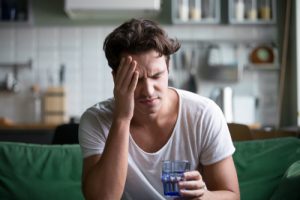Flexeril (cyclobenzaprine) Withdrawal
Cyclobenzaprine, also known by the brand names Flexeril (now discontinued) and Amrix, is a skeletal muscle relaxant. Its primary medicinal use is for pain, tenderness and limitation of motion associated with muscle spasms.
Cyclobenzaprine is available in several different forms, including tablet (5 mg, 7.5 mg, or 10 mg doses) and extended release capsule form (in 15 mg or 30 mg doses).1,2
Physical therapy and rest are generally recommended with cyclobenzaprine treatment, and treatment with this medication is designed to be short-term (up to 2 to 3 weeks).1 While rare, it is possible for someone ending their cyclobenzaprine use to experience certain muscle relaxer withdrawal symptoms.3
Cyclobenzaprine Withdrawal Symptoms

Someone quitting cyclobenzaprine might experience mild discomfort that is similar to the withdrawal symptoms that occur in individuals who use tricyclic antidepressants. Cyclobenzaprine withdrawal symptoms may include:3
- Malaise
- Nausea.
- Headache.
If you are only taking cyclobenzaprine, withdrawal is not likely to be serious. Your physician can help you taper off the drug to avoid unpleasant symptoms of withdrawal. If you are physically dependent on one or more other drugs, however, muscle relaxer withdrawal may be uncomfortable or complicated.4
Cyclobenzaprine Abuse Potential
Is Flexeril addictive? Cyclobenzaprine is not a controlled substance in the United States; however, it does appear to have some potential for abuse.2
According to 2017 data from the Substance Abuse and Mental Health Services Administration, an estimated 250,000 million people misused muscle relaxants in 2016.5
Also, per the Drug Enforcement Administration, internet activity suggests that people are intentionally misusing cyclobenzaprine with other drugs for a high, and emergency room visits involving the drug more than doubled between 2004 and 2010.2
It is especially risky to abuse cyclobenzaprine with other drugs that depress the central nervous system, such as:
- Benzodiazepines (e.g., Xanax, Valium)
- Barbiturates (e.g., phenobarbital)
- Alcohol
Cyclobenzaprine may intensify the effects of the drugs above and the individual may suffer an overdose. In cases of deliberate overdose, ingestion of multiple drugs is common.6
Overdose may result in extremely serious problems including seizures, cardiac arrest, neuroleptic malignant syndrome, and death.3
Treatment for Substance Abuse

The scope of cyclobenzaprine misuse and abuse appears to be very small in comparison with other drugs like opioids, benzodiazepines, or alcohol.5
However, some people may add cyclobenzaprine to the mix while abusing their main drug of choice.
Misusing cyclobenzaprine may be indicative of a larger problem with substance abuse. Signs of a problem with substance abuse include:7
- Drop in motivation
- Changes in sleep or eating habits
- Weight changes
- Poor hygiene/carelessness about physical appearance
- Drop in performance at school or work
- Impaired coordination
- Changing social groups
- Increase in secretive or suspicious behavior
- Mood swings
- Personality changes
- Changes in hobbies
- Neglect of personal obligations
If you are struggling with substance abuse, including abuse of cyclobenzaprine, don’t wait to get treatment. Combining it with other drugs to get a better high could lead you to experience a potentially fatal overdose.3
Treatment for substance abuse includes some or all of the following components:
- Medical detox: A physician-assisted withdrawal management program (medical detox) targets the main drugs of abuse and may utilize medications to alleviate symptoms and cravings. In some cases, the drug of abuse may be slowly tapered down versus stopped abruptly to avoid complications and significant discomfort. Medical detox is particularly important for dependent on drugs associated with dangerous withdrawal symptoms, including benzodiazepines and alcohol, which can both cause seizures and other serious complications.4
- Inpatient treatment: For some, inpatient rehabilitation after detox is the best option to prevent relapse, as it presents the opportunity for a full focus on recovery in a substance-free living space.
- Outpatient treatment: For those with more mild substance use issues or those who have already completed an inpatient program, outpatient programs offer the chance to participate in therapy while attending to your responsibilities at home. Available outpatient options include intensive outpatient (IOP) and partial hospitalization program (PHP).
- Medication-assisted treatment (MAT): Depending on the drugs you’ve been abusing and whether you’re a good candidate for this type of treatment, you may be given certain medications to help curb cravings and keep you sober. MAT drugs include medications like Suboxone or methadone for opioid addiction and Acamprosate for alcohol addiction.4,8
- Involvement in peer support groups: Connection with and support from others in recovery is a vital part of maintaining sobriety. In treatment, you’ll participate in recovery groups, 12-step or other programs like SMART Recovery. Once treatment ends, you’ll be encouraged to continue your participation to stay accountable and to offer support to others.
- Aftercare: After treatment ends, your focus on recovery shouldn’t. Aftercare may take several different forms, such as moving into a sober living home, participating in your treatment program’s alumni group, continuing on in therapy, etc.
Get Treatment for Prescription Drug Misuse Near Dallas
Greenhouse Treatment Center offers a continuum of care that encompasses all levels of care. If you’re struggling with an inability to stop misusing prescription and/or illicit drugs, we can help. Whether you’re looking for a safe place to detox or an outpatient program, or everything in between, we are here for you.
Don’t let your addiction reach rock bottom. If you or someone you love is struggling with the devastating effects of addiction and are unsure of where to turn, call us today at . Compassionate admissions navigators are ready to help you get admitted today.
Greenhouse Treatment Center, American Addiction Centers’ Texas drug rehab facility, is ready to help you get the treatment you need.
Contact us to learn more about our spa-like treatment center, using insurance to pay for rehab, and other ways to cover the cost of treatment. You can also quickly and easily check your insurance coverage using our now.